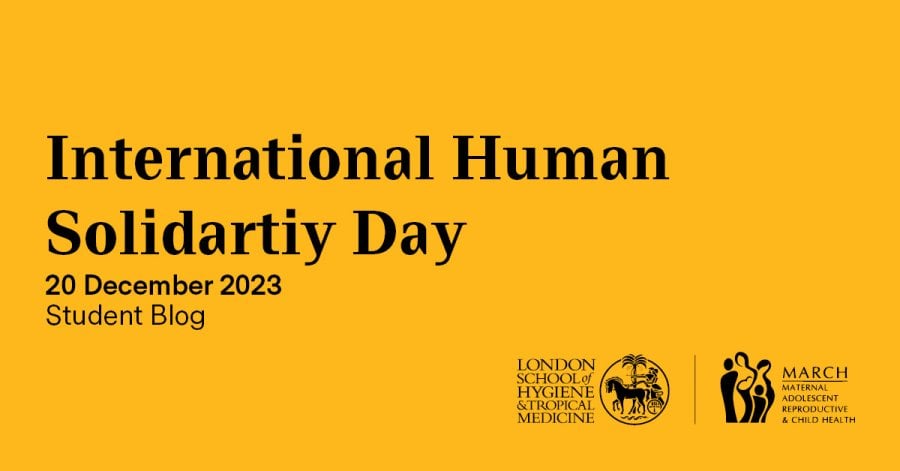
The breeze is cold, the holiday lights are bright and the London School of Hygiene & Tropical Medicine (LSHTM) is gearing up to end the first term of 2023. Auspiciously, our last day of term coincides with United Nations International Human Solidarity Day. Solidary has been both an elusive and fluid term, but when oriented in terms of global health, the UN states that it is a foundation for addressing global poverty, hunger, and disease, right within the scope of LSHTM and the work being done. These past few years we have seen immense phenomena and events that have unfortunately thwarted global solidarity. In this post-pandemic world, there has been a rise in both conflict and climate change as it impacts global health for all, especially women, adolescents, and children.
With violence and catastrophe in the Democratic Republic of Congo, Sudan, Palestine, Ukraine, Armenia, the Tigray Region of Ethiopia, Yemen, and Afghanistan, we are seeing a rise in a multitude of global health and public health crises. Issues of climate and conflict were discussed at the COP28 conference, in particular, highlighting the increased violence and rising temperatures in the Gaza Strip. Additionally, Yemen has been experiencing rising temperatures and ongoing conflict since 2011 and is now also facing potentially exacerbated health issues with news that the United Nations World Food Programme is pausing general food distributions in some areas of Yemen. Ukraine had already been experiencing challenges to mitigating climate change impacts, alongside infrastructure damage and rising food prices, issues such as hunger may be aggravated. These are global and public health disasters that LSHTM students, staff, and faculty, past, present, and future will need to grapple with. These issues will require a multi-sectoral and interdisciplinary approach with cooperation, collaboration and communication with stakeholders from across the world. Addressing these issues requires solidarity.
The dual combinations of climate change and conflict “are among the most important factors preceding food system failures and malnutrition crises around the world”. These socio-political and environmental catastrophes are having more serious consequences for maternal and child health outcomes, the World Health Organization notes that climate hazards are linked to maternal and neonatal morbidity, gestational diabetes, pre-term birth and low birth weight. On the other hand, conflict has direct impacts on healthcare systems and services such as reduced reproductive and maternal health services and poorer child vaccination uptake, whilst having higher rates of child and maternal mortality.
If the solution to the conflict is peace, and the need to address climate change is a collective effort, then now, more than ever, global solidarity is needed, especially as maternal, infant, and adolescent health are on the line. The idea of where and how to start puts LSHTM in a unique and special predicament. We have students, staff and faculty members hailing from all continents, varying in age and cultural background. We come with diverse perspectives, an abundance of knowledge, and a variety of skills. LSHTM has the grounds for which the seeds of international solidarity have the potential to bloom at our very own Keppel Street building.
If you enjoyed this article and would like to build a career in global health, we offer a range of MSc programmes covering health and data, infectious and tropical diseases, population health, and public health and policy.
Available on campus or online, including flexible study that works around your work and home life, be part of a global community at the UK's no.1 public health university.
